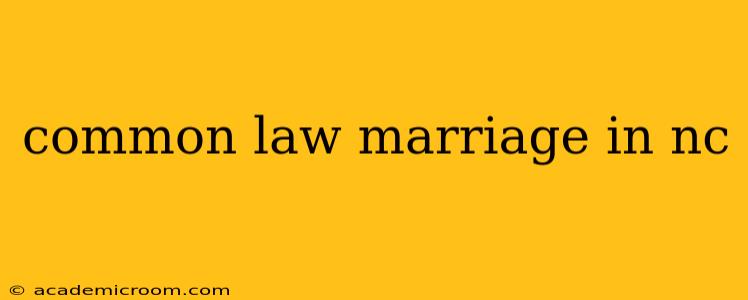North Carolina, like a handful of other states, recognizes common-law marriage, also known as informal marriage. However, it's crucial to understand that establishing a valid common-law marriage in NC requires meeting specific legal criteria, and the process isn't as simple as just living together. This guide will delve into the intricacies of common-law marriage in North Carolina, addressing common questions and misconceptions.
What Constitutes a Common-Law Marriage in North Carolina?
To legally establish a common-law marriage in NC, three essential elements must be present:
-
Capacity: Both individuals must be legally capable of entering into a marriage. This means they must be of legal age, not already married to someone else, and possess the mental capacity to understand the nature of the commitment.
-
Present Agreement: Both parties must have a present agreement to be married. This isn't a casual understanding; it requires a clear and mutual intention to be husband and wife. Simply living together or having children doesn't automatically equate to a common-law marriage. The agreement must be more than just cohabitation; it signifies a commitment to a marital relationship.
-
Cohabitation: The couple must live together as husband and wife. This requires a genuine marital relationship, not just sharing a living space. The couple should present themselves to the community as married, sharing finances, responsibilities, and demonstrating a commitment to a life together as a married couple.
How is Common-Law Marriage Proven in NC?
Proving a common-law marriage in North Carolina can be challenging and often requires substantial evidence. The burden of proof rests on the individuals claiming to be married. Courts typically consider the following types of evidence:
-
Testimony from the couple and witnesses: Statements from both parties and individuals who observed their relationship are crucial. This testimony must detail the agreement to be married, the cohabitation, and how they presented themselves to others.
-
Financial records: Joint bank accounts, tax returns filed jointly, and other financial documents indicating shared finances can serve as evidence of a marital relationship.
-
Joint ownership of property: Evidence of jointly owned property, such as a house or car, can support the claim.
-
Photographs: Pictures depicting the couple together at events, celebrations, and family gatherings can help illustrate their presentation of themselves as a married couple.
-
Letters and correspondence: Letters, emails, or other correspondence referencing the relationship as a marriage can be valuable evidence.
It's crucial to gather as much evidence as possible, as courts take a thorough approach when determining the validity of a common-law marriage claim.
Does North Carolina Recognize Common-Law Marriages Formed in Other States?
Yes, North Carolina generally recognizes common-law marriages that were legally formed in other states that allow them, provided the marriage was valid where it was established. However, the validity of the marriage will be judged according to the laws of the state where it was formed.
Can a Common-Law Marriage Be Dissolved in North Carolina?
Yes, a common-law marriage in North Carolina can be dissolved through a legal process similar to a traditional divorce. This involves filing a petition for divorce with the appropriate court and following the established legal procedures.
How Can I Avoid Issues with Common-Law Marriage?
If you don't want to be considered legally married under common-law, it's essential to be clear about your relationship status. Avoid presenting yourselves as married to others, maintain separate finances, and refrain from any actions that could be interpreted as signifying a marriage agreement.
What Happens to Property and Assets in a Common-Law Marriage Dissolution?
In a common-law marriage dissolution, the division of property and assets generally follows similar principles to those in a traditional divorce. The court will typically aim for an equitable (fair) distribution of marital property acquired during the marriage.
Is it Harder to Prove a Common-Law Marriage than a Traditional Marriage?
Yes, proving a common-law marriage is significantly more difficult than proving a traditional marriage. The absence of a formal ceremony and the reliance on circumstantial evidence makes establishing a valid common-law marriage a challenging legal process.
This information is for general guidance only and does not constitute legal advice. If you have questions about common-law marriage in North Carolina, it is essential to consult with a qualified attorney. They can provide personalized advice based on your specific circumstances.
